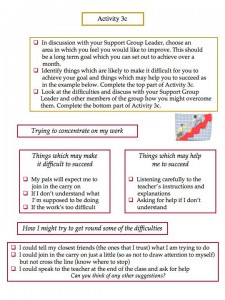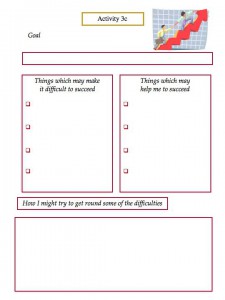What are Support Groups and who are they for?
Support Groups were first introduced to a Secondary school in the West of Scotland in response to a desire to ‘make a difference’ for pupils who were finding it hard to cope with the norms of school life or who were felt to be at risk of not achieving their potential. 150 pupils over a seven year period successfully completed the intervention.
 How are pupils chosen and why?
How are pupils chosen and why?
Pupils are nominated by their teachers who are asked to outline the concerns which they have about the pupil and what they hope the pupil will gain through participation. Not all pupils who participate within groups are in trouble at school. Some pupils are recommended to take part in the groups for preventative reasons, perhaps to help them to cope at a difficult time or to cope with the transition from Primary to Secondary.
What are Support Groups about?
The Support Group aims to develop in pupils, understanding of themselves and their relationships with other people so that it helps them to develop:
- greater self-control and self-responsibility – being able to apply what they have learned in different situations
- better relationships with other people
- in confidence and self-esteem
- more positive attitudes towards learning and school.
Process for starting the Support Group
Pupils and their parents will be approached to seek permission for participation within the Support Group. Groups of 4 pupils meet weekly for around 1hr a week with a Support Group Leader for a minimum of 16 weeks of the school year. Every effort should be made to minimise disruption to learning and the timetabling of the group should be carefully negotiated with senior management, principal teachers, class teachers, parents and pupils.
What do pupils do in groups?
Most of the activities are discussion rather than writing based. Pupils will do the following:
- set their own behaviour targets for the coming week in consultation with their Support Group Leader
- complete a pupil diary describing an incident which has happened to them during the week
- do a group based activity which encourages them to reflect upon their behaviour and learning.
One of the most important aspects of the approach is the opportunity it provides for pupils to talk about things from their own point of view in a ‘safe’ environment but, more importantly, to begin to develop an understanding of other people’s points of view and an understanding of how their behaviour affects not just themselves but others.
The target-setting booklet
Every pupil will be issued with a target-card or booklet in which they, with the help of their Support Group Leader, choose a weekly target to improve upon their behaviour. Targets generally start small – ‘ bring a pencil to school’ and progress to being more ambitious. The Support Group Leader (or another nominated person, such as a Form Teacher) will meet with the pupil each day to check upon progress and each class teacher who has contact with the pupil will be expected to write a short comment. The target-card or booklet will either be sent home every day or every week for parents to write a comment. It is very important that parents become involved in this process. However, it is also important that the school adopts a flexible and responsive approach as not all pupils respond positively to target-setting and many lack the organisational skills to be able to cope with it. In these circumstances, the Support Group Leader should work in consultation with the parent, pupil and class teachers to find an approach which meets the needs of the child but still enables the child to take responsibility for the process.
Powerpoint presentations for Support Group Leaders, parents and school staff can be found on the CD rom which accompanies the book.



